Fighting Sioux win 3rd straight playoff title
By John Gilbert
SAINT PAUL, MN. — If it was the last time the North Dakota hockey team ever wears the familiar green jerseys with the stylish Native American warrior on the chest, the Fighting Sioux gave the controversial logo and nickname a proper sendoff Saturday night, before 16,838 observers at Xcel Energy Center — whipping Denver 4-0 in the WCHA Red Baron Final Five championship game.
North Dakota thus claimed the Broadmoor Trophy for an unprecedented third consecutive time, and gave Aaron Dell an easy shutout for his third victory in three days. The Sioux (25-12-3) ride into next week’s NCAA tournament on the wings of a seven-game winning streak, which started, ironically, after a 5-3 loss that resulted in a split at Denver. They could, in fact, return to Xcel Center as the No. 1 seed of the West Regional, when pairings are announced Sunday.
However, wherever they go, it will be clad in new North Dakota jerseys, because the NCAA has decreed that if North Dakota insists on wearing its Fighting Sioux-logo jerseys, or uses the Fighting Sioux nickname, they will forfeit any NCAA victories.
North Dakota’s old Fighting Sioux jerseys worked just fine to stop Denver (24-13-4). The Pioneers were outshot 29-22 and unable to muster any sustained offense, while the Fighting Sioux got a goal and an assist from both Carter Rowney and Mark MacMillan, and added power-play goals from Brock Nelson — his fourth in three Final Five games — and Michael Parks.
It used to be customary that teams that had to win a play-in game to reach the semifinals would never have enough staying power to win three games in three days, but Minnesota-Duluth pulled it off in 2009, and North Dakota won three in 2010. This year, however, was the first in which both finalists were playing for the third time in three days.
Denver has had a rougher road, playing the sixth game in nine days. First, the Pioneers had to go three games to beat Wisconsin, losing 1-0 and winning 3-1 and then 3-2 in overtime to get to Xcel Center. After three days of rest, the Pioneers had to go overtime again to beat Michigan Tech 3-2 Thursday, then beat UMD 4-3 in two overtimes Friday in the longest game in Final Five history. If six games in nine days wasn’t enough, they included four overtime periods, the equivalent of another full game, making it more like seven games in nine days.
North Dakota beat St. Cloud State 4-1 on Thursday, and though the Sioux seemed tired as they fell behind 3-0 through the first half of its semifinal against Minnesota Friday, before rallying to win 6-3. Maybe there was a positive carryover from scoring six unanswered goals against the Golden Gophers.
“We wanted to play a complete game tonight,” said North Dakota coach Dave Hakstol. “We didn’t play complete games either Thursday or Friday, and we wanted to exploit the chance they might be a little more tired, because of how much they’ve had to play. Our energy level was pretty good, and we were plus-one 5-on-5, scored two power-play goals, and one short-handed.”
It appeared that the Pioneers may have finally been overtaken by battle-fatigue, and it didn’t help their manpower when they lost defenseman Josiah Didier to an injury, then offensive star Jason Zucker went out in the third period and was taken to a hospital for an MRI on an “upper body” injury. At one point coach George Gwozdecky said he moved two forwards back to play defense. “I noticed how much quicker we were able to go back and get the puck,” Gwozdecky said. “That made me realize how tired we were.”
Gwozdecky praised North Dakota for its play, however. “North Dakota was sharp and moved the puck well,” he said. “The way they played last night with their great comeback, and the way they played tonight, I would say they would be a very likely Frozen Four team.”
Goaltender Aaron Dell was sharp in his third game in three days, which, he said, he hadn’t done since his junior hockey days in the Alberta league. The Pioneers had the first great scoring chance, but Dell came up with the save when Nate Dewhurst blasted a one-timer from the slot after a feed from behind the net. Later, Dell said that was the toughest save he could remember. “The guys made it pretty easy for me,” he said.
Denver went back to goaltender Juho Olkinuora, who won against Tech, after Sam Brittain made a tournament record 67 stops against UMD.
A few seconds after Dell’s big save, Mario Lamoureux wound up to shoot at the other end. Denver freshman Matt Tabrum hooked his stick to prevent a shot, and was called for hooking at 16:25, and North Dakota jumped at the power-play chance. Corban Knight pulled a left-corner faceoff back to Dillon Simpson, who shot from the top of the circle. The blocked shot popped up into Brock Nelson’s body, and he let the puck drop, then scored his 27th goal of a sterling sophomore season into the Denver net at 17:43.
“Knighter made a big play winning the faceoff, and when Dillon shot the puck bounced up off the goalie and hilt me,” said Nelson. “I was just lucky to be in the right place, and I got a good stick on it.”
On the next shift, North Dakota center Carter Rowney skated to the left edge as Mike MacMillan sent him a perfect pass for a goal at 18:29, and the two goals in 46 seconds sent the Fighting Sioux into intermission up 2-0.
“They started off better than we did, and they kept it rolling,” said Denver center Drew Shore. “We don’t play three games in a row much, but the first goal in any game is huge. They got it, and I thought that was one of the big turning points.”
True, if both teams were weary, the first goal could provide an adrenaline jump-start, and the Fighting Sioux kept feeding it. Early in the second period, they were bolstered by two Denver penalties, and on the second of those, Michael Parks scored a power-play goal with a quick shot from deep on the right side at 9:58.
To that point, the Fighting Sioux hadn’t drawn a single penalty, but they got the next three. Rowney’s second penalty in a row opened the third period, but instead of giving hope to the Pioneers it was the Sioux who scored, short-handed. MacMillan blocked the puck free from a Denver skater at center ice and raced in alone at Olkinuora and drilled a shot into the left edge at 7:11.
A goal at 7:11, short-handed at that, for a team wearing green uniforms on St. Patrick’s Day in downtown Saint Paul — how could the Pioneers overcome that?
They couldn’t. About the only highlight for Denver in the third period was when Brock Nelson fired the rebound of Danny Kristo’s shot into the net, the officials reviewed it and disallowed the goal before Kristo had skated into the goal crease and bumped relief goalie Adam Murray an instant before the puck crossed the goal line.
Gwozdecky said, “We are really looking for a little rest. Whatever region we’re in, great. We just need some rest, and maybe we could even get a couple of our long-term injured players back.”
Sioux second-half surge sinks Gophers 6-3
By John Gilbert
SAINT PAUL, MN. — The first semifinal set Red Baron Final Five records for length of time, and saves, but the second semifinal provided an even more remarkable turnabout, as North Dakota spotted top-seeded Minnesota a 3-0 lead, then the Fighting Sioux stormed back for six unanswered goals to stun the Golden Gophers 6-3 in front of an Xcel Energy Center crowd of 16,738.
The game was amazingly split exactly in half, as the Gophers led 3-0 at the halfway point, and the Fighting Sioux simply took the game over, gaining momentum with every goal. North Dakota (24-12-3) roars into Saturday night’s WCHA playoff final against Denver, which beat Minnesota-Duluth 4-3 in double overtime after blowing a 3-0 lead. It means that this year’s champion will have won three games in three days.
“We’ve had a lot of comebacks,” said Mario Lamoureux, the Sioux captain and third line center, who scored two goals in the third-period onslaught. “But I’ve never been part of a game where it was completely dominated one way, then the other.”
As if carrying out the exact opposite of the first game, Minnesota (26-13-1) was rested and ready with the bye, and owned all the plays and the momentum, aided by all three power plays in the first period, when the Golden Gophers outshot North Dakota 12-2. On the second of those power plays, Gopher freshman Kyle Rau scored his 17th goal of the season as he hurtled over goaltender Aaron Dell while scoring for a 1-0 lead.
In the second period, Erik Haula shot from center point and Jake Hansen deflected it in for another power-play goal, at 5:55, to make it 2-0. And at 10:01 — the midpoint of the middle period — Zach Budish deflected in Justin Holl’s pass from wide to the right of the net, and the Gophers were cruising at 3-0.
“We played some of the best hockey we’ve played and jumped off to a 3-0 lead,” said Hansen. “They got one goal, and I think we were scared of losing. We were outshooting them something like 23-8, but after they scored, we played horribly. We went away from our system, and we played really sloppy and they took the momentum.
“It went from 3-0 to 3-3, but we’ve got to keep fighting. We just didn’t have it in us tonight. I think we were more shell-shocked than anything.”
With 5:31 left in the second period, North Dakota coach Dave Hakstol called a time out. It didn’t seem as though any words could make a difference, because Minnesota seemed to be in complete control. “Nothing special was said,” Hakstol said. “We had tired bodies on the ice, and we had iced the puck, so we couldn’t change. We had absolutely no gas in the tank in the first half of the game.”
But from then on, it was all North Dakota.
Derek Forbort, a sophomore defenseman for North Dakota, flung a deflected shot from the right point that eluded Gopher goaltender Kent Patterson at 14:51, giving the Sioux their first sign of life, but at 3-1, the third period started with no illusions for the Sioux, who were being outshot 23-11 at that point. Incredibly, North Dakota started rolling in the third period and not only pumped five more goals, but outshot the Gophers 17-2.
“We knew we had to regroup,” said Lamoureux. “We just got going, rolled with the momentum, and the game became fun.”
There was still some catching up to do. At 5:31 of the third, Michael Parks went to the net and had a pass deflect in off his skate to cut it to 3-2. “I went hard to the net, and the puck bounced off me somewhere,” said Parks.
Exactly 30 seconds later, Brock Nelson blocked a high bouncing puck and fired it in to tie the game 3-3. The large contingent of Fighting Sioux fans in the crowd went crazy, and the Sioux poured it on. Patterson in goal for the Gophers was like a young man caught at the base of an avalanche coming down upon him.
Lamoureux, who had exactly one goal all season but willingly played his leadership role to the hilt, scored at 9:42 to lift the Fighting Sioux to their first lead of the night at 4-3. Minnesota, which hadn’t drawn a single penalty, got one then, at 9:56, and Corban Knight scored at 10:19, on North Dakota’s only power-play chance, to make it 5-3.
Minnesota coach Don Lucia was asked if he considered taking a time out and he said: “I don’t know if it would have done any good.”
Lamoureux scored again by rushing up the right side, sending a hard backhand pass across the slot to Mark MacMillan, then going to the net and jamming in the rebound at 16:10. He now has three goals for the season.
Goaltender Aaron Dell, who looked helpless in the first half of the game, never allowed another goal, and the Fighting Sioux stormed into the championship game.
“We had great energy and a very good first period,” said Lucia. “Congratulations to North Dakota, because we couldn’t get it back going. We’ve been very good in the third period all season — we’ve only allowed 18 goals total in the third period. And we gave up five tonight. We punched, they punched back, and we wilted.”
Denver blows 3-0 lead, tops UMD in 2 OTs
By John Gilbert
SAINT PAUL, MN. — Zac Larraza is a Denver freshman from Scottsdale, Ariz., whose most prominent role in Friday’s first semifinal at the WCHA Final Five was to serve a major penalty for Denver teammate Larkin Jacobson. Until the second 20-minute overtime, that is. Then, after both teams had played to exhaustion in the longest game in WCHA playoff history, Larraza got on the Xcel Energy Center ice and scored his first collegiate goal to send the Pioneers into the playoff final with a 4-3 victory over Minnesota-Duluth.
The play started as a rush by Denver’s fourth line, and freshman center Matt Tabrum fired a shot from the right side that glanced off the right pipe and out toward the blue line. Defenseman John Ryder shot again.
“Ryder threw it at the net and it hit me in the chest,” said Larraza, who let the puck drop in front of him, pulled it to his right as goaltender Kenny Reiter went down, and then flicked a backhander into the open goal. He did it with the poise and certainty that a veteran scorer might have shown. Instead, Larraza was dressed as Denver’s 13th forward — a spare after the four regular lines.
“That was the biggest goal I’ve scored,” said Larraza. To say nothing of the only one. “I got about 10 shifts in the game, so I was still fresh at the end.”
Officially, the goal came at 8:14 of the second 20-minute overtime, which means it was after 38:14 of sudden-death play, making the game’s duration 98 minutes, 14 seconds, breaking the league playoff record, and leaving 12,804 fans nearly as drained as the players. Another record set in the game was the 67 saves by Denver goaltender Sam Brittain, who withstood UMD’s determined comeback from a 3-0 deficit, which featured the Bulldogs outshooting Denver 70-49.
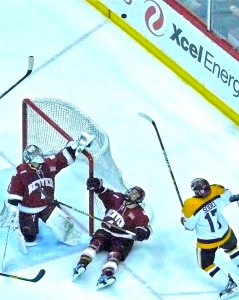
Goalie Sam Brittain, defenseman Josiah Diddier, and UMD's Mike Seidel watched the bouncing puck's trajectory.
The victory sends Denver (25-12-4) into Saturday’s championship game against the winner of Friday night’s Minnesota-North Dakota second semifinal. UMD goes home 24-9-6, but certain to have a high seed in next week’s NCAA tournament field.
“We dug ourselves a hole at the start, but we did a lot of good things in the second half of the game, and it became a helluva hockey game,” said UMD coach Scott Sandelin. “Both teams had a lot of chances and both goalies made some tremendous saves.”
UMD, which lost a first-round Final Five game to Bemidji State a year ago, before catching a hot streak that went all the way to the NCAA championship on the same Xcel Center ice, had a first-round bye this time as league runner-up, but all that got the Bulldogs was the challenge of playing catch-up against preseason WCHA favorite Denver, the league’s third-place finisher.
As often happens in the Final Five, teams resting with first-game byes don’t always have a big advantage in the semifinals, because during the long season of two-game series, many teams play better in the second game. That theory seemed at work, as Denver, which had to beat Michigan Tech 3-2 in overtime on Thursday to reach Friday’s semifinals, gained the early advantage and built on it during the first period and a half.
The Pioneers led 1-0 on Shawn Ostrow’s first-period goal, when the junior center rushed up the left side 2-on-1 and sent a perfect shot into the upper right corner at 8:01. Denver boosted the lead to 3-0 in the second period, when Jason Zucker scored at 3:26, and at 6:02, Ostrow swung out from behind the net and passed across the crease, where Dustin Jackson shot past Kenny Reiter to score as he was being taken down at the right edge.
The Bulldogs were increasing their tempo by then, however, and when they got a power-play chance midway through the second period, they cracked Sam Brittain’s shutout bid, as Mike Seidel pulled a rebound away from Brittain and deposited it behind him at 10:57.
“That power play turned the tide for them,” said Denver coach George Gwozdecky. “I don’t like to use basketball analogies, but in basketball you hear coaches say they knew the other team would make a run, and in our game, even though we had that 3-0 lead, you knew they were going to make a run.”
Jacked up by the goal, the Bulldogs started firing shots from every angle, and closed in at 3-2 on another Seidel goal, at 13:45. Connolly was absorbing some heavy contact while continuing to work the left boards in the DU zone, and he finally chipped the puck to Seidel in the left circle. Seidel glided across the slot and fired a perfect shot past a screening defenseman and into the upper left corner. UMD went on to outshoot Denver 25-10 in the high-tempo second period, which ended with Seidel swiping a rebound and nearly scoring at the left pipe as the horn sounded. “I thought I had a chance to sneak it in, but the goalie made an unbelievable save with his toe,” Seidel said.
The Bulldogs couldn’t get the equalizer until 12:38 of the third period. Defenseman Drew Olson got the puck from Seidel, who was having an impressive day, and Olson moved left to right toward the slot before sending the puck over to Jack Connolly, a left-handed shooting center who was cranked and ready to rip a one-timer into the upper right corner to knot the game 3-3.
It was Connolly’s 19th goal, to go with 39 assists for the WCHA regular-season scoring champ, who already is a two-time All-America and is a Hobey Baker finalist. Finishing with a flourish, the Bulldogs outshot Denver 17-7 in the third period, making it 42-17 as they came alive for the second and third periods, and 50-24 for all three periods.
“To their credit, they threw everything at the net,” said Brittain, who didn’t play in Thursday’s first game, and who might not play in the final, after his heavy lifting against the Bulldogs.
Regulation time ended ominously for the Bulldogs, however. After working feverishly to come back from a 3-0 deficit, they allowed Zucker to burst through for a final chance. As he turned the corner and cut to his right, Zucker had his feet taken out from under him by a diving Chris Casto. Zucker slid harmlessly past the goal-mouth, but Casto went to the penalty box with 1.3 seconds remaining, which gave Denver a power play overlapping into overtime.
Reiter was brilliant int he 20-minute first overtime, but Brittain matched him as the teams, obviously tiring, played with wide-open offense, Denver outshooting UMD 16-15 as both teams went all-out trying to end the game on the next shift. When the first overtime ended without a goal, Denver had a slim 16-15 edge in shots and the teams went to their dressing rooms still 3-3, and with UMD holding a 65-40 shot margin. But in the second overtime, Denver had a 10-4 edge in shots.
“Our best hockey was in overtime,” Gwozdecky said. “Whatever it takes; it wouldn’t be fun if it wasn’t exciting.”
3 Duluth hockey teams, no state titles
THREE DULUTH TEAMS, BUT NO STATE TITLE
By John Gilbert
Maybe it was just coincidence, but wandering around Xcel Energy Center last week at the 68th Minnesota State High School Hockey Tournament provided a unique perspective within a 24-hour span.
In the Class A quarterfinals on Wednesday, Marshall was crushed 7-0 by Breck, one of the two private school elephants in the Class A room, while Hermantown whipped Rochester Lourdes 7-2. On Thursday, Class AA took the big stage, and upsets ruled the day, as Maple Grove was beaten by Hill-Murray 5-2, and unseeded Moorhead took out Eagan 4-0 in the afternoon session.
In the first game press conference, Hill-Murray coach Bill Lechner, an outstanding coach, was asked about how Maple Grove made a couple of cute plays and got ahead 1-0, but the Pioneers threw some bodychecks and turned the game around for the 5-2 victory. “Cute won’t win games,” Lechner said. “It’s win moments, but not games.”
Very interesting way to put it, I thought, and the comment stayed with me as I walked around the concourse before the first night game, in which No. 1 seed Duluth East was about to take on Lakeville South. There was no question East was the best team in the state, and that coach Mike Randolph had painstakingly juggled through injuries and put them together to be primed and ready to go all the way, when I ran into a familiar face.
It was a man I knew, the parent of an East player, who wanted to introduce me to his wife. We talked for a while, about the afternoon’s upsets, and about East’s chances of going all the way. Everything is in place, I suggested, except maybe for one element.
“The only thing I worry about,” I said, “is that I’m a big believer in cosmic energy — positive kharma — that only comes from everyone pulling together in complete unity, and I’ve never sensed that all the parents, for example, were all behind the team, pulling for the team’s success.”
Though I had just met her for the first time, the man’s wife said, “That comes from the top…from Randolph.”
“What?” I said. “I’m just suggesting that all the parents may not be pulling together and you’re saying it’s the coach’s fault? You think that the person who could benefit the most from unity is responsible for hurting the unity? Do you realize you’re providing evidence of exactly what I’m talking about when I say I’m worried about kharma?”
She said: “Don’t blame the parents for a lack of unity.”
I was astounded. Her husband didn’t say much, but it was clear he supported her negative energy, and neither one of them seemed to grap the divisiveness they were contributing to, nor did they realize that in my theory of cosmic energy, the lack of unity is a factor even if nobody else hears it. At that instant, another man walked up to say hello to the guy I was talking to. He was grinning broadly as he said: “Isn’t this great? The greatest thing in the world is having played hockey, and coming down here every year to this tournament, that now I’m able to watch my son play in it.”
When they introduced him to me, he said he was the dad of a player on the Marshall team, which had been blown out 7-0 by Breck the day before. “How did they do today in consolation?” I asked. He told me Marshall had lost 5-4 to Little Falls.
“So they’re on the bus heading home,” he said. “But I asked my son what he thought of the whole thing, and he said, ‘It’s the greatest experience of my life.’ ”
I continued on my way, shaking my head about how the dad of a kid whose Marshall team came to state but went two-and-out claimed it was a great experience, just to be part of a team that made it to state, but that the negative vibes emanating from the parents of a kid on the No. 1 ranked Duluth East team reverberated even before the Hounds opening game. As I got on the elevator to head for the press box, I reflected on how difficult it is for Randolph to blend his players into impressive unity in those dressing rooms all around the state, while having to overcome those outside influences that seem to be decidedly negative.
Kharma may not have had anything to do with it when unheralded Lakeville South overcame a 1-0 East lead and claimed a 3-2 victory, but you can’t convince me of that. By the way, when it was 3-1 in the final minute, the way I saw it was Dominic Toninato won a left-corner faceoff, Jake Randolph got off a shot that hit Lakeville South goalie Tyler Schumacher and bounced high above the crease. Alex Toscano, the smart junior center on the second line, who Randolph sent on as a sixth attacker, swung at the puck when it was above the crossbar, but, fortunately, missed it. Then he swung again as the puck dropped back to legal height, and knocked it in, with 10 seconds remaining. A referee supervisor monitoring the video review, confirmed what I saw, but the official scorer gave the goal to Trevor Olson, who had scored East’s first goal in the game, and is the regular winger on the Toninato-Randolph line. I asked officials to check the goal again to be sure, and when they went to, the video had been erased to be reused for the next game. Maybe I’m wrong, but if Toscano got the goal, congratulations. And I tried.
As for kharma, the more likely scenario was that Lakeville South coach Kurt Weber’s game plan was executed to perfection to spring the upset. “East is the best high school team I’ve ever seen, systematically,” Weber said. “They do some things and you lose track of their weakside winger, then they go to him so well. I’m so impressed with how East plays that I called Mike and asked him for a scrimmage before the season. We took a school bus up to Duluth, and in the scrimmage, just like tonight, we stood around and watched them pass the puck around for the first 10 minutes, before we realized we had to start playing.
“When we realized we’d have to play East, we cut apart some videos and made our kids watch them, to see how well they used the rink-wide passes to the weakside winger, and if you let them get up to full speed, how tough it is to stop them. This is the smartest group I’ve ever coached, and we showed them what we’d have to do to stop them. That’s what it takes to beat the No. 1 team in the state.”
I was digesting the coincidence that the opposing coach crafted the huge upset because he was so impressed with Mike Randolph’s system for this East team, even if some of East’s own parents thought differently about their coach. About then, Bill Lechner’s motto came back, because East usually scores goals that are stunning, and might be called “cute,” and there was nothing cute about the way Lakeville South prevented all but two of them.
My underlying theme of positive kharma returned when Benilde-St. Margaret’s rose up to surprise Edina in the final game, breaking a 2-2 tie that seemed destined for overtime when Chrsistian Horn scored with 23.9 seconds remained in the third period. Benilde, with complete unity behind coach Ken Pauly, had the added emotional kharma of Jack Jablonski, watching from a wheelchair in a suite after suffering a paralyzing injury in a junior varsity game Dec. 30.
Now we jump ahead 12 hours, to Hermantown’s 3-2 victory over Thief River Falls in the Class A semifinals — a game in which superb Hawks defenseman Jared Kolquist scored the tying goal six minutes into the third period, with 5:15 remaining, and then Jared Thomas scored his second goal of the game with 5:15 remaining. Incidentally, why aren’t Division I colleges all over Kolquist, who is the emotional leader of the Hawks and a true warrior. Coach Bruce Plante said he talked to Thief River Falls coach Tim Bergland before that game and, knowing that St. Thomas Academy and Breck were playing in the other semifinal, told him, “We’re playing for the public school championship.”
The thought hit me that my perception of Hermantown’s program was that there seems to be complete unity, that not only were all the players on the same page, but all the parents seemed totally supportive.
“We’ve got great parents,” said Plante. “The parents have left me alone — no emails, no phone calls. I’ve told them that if they want to get rid of me, just start bitching. Same with the players. I told them if they want me to quit, just tell me. I’ve retired from teaching, and I like to bow-hunt and ice fish.”
A day later, Moorhead jumped ahead of Hill-Murray in the AA semifinals, outshooting the Pioneers 7-1 at the start before junior Hill-Murray defenseman Blake Heinrich jolted Aaron Herdt with the most jolting bodycheck of the tournament. The Hill-Murray fans taunted the Spuds at that point with chants of “Mashed potato…mashed potato.” That hit created an interesting changeover. As Moorhead tried to show they could hit, too, the Spuds seemed to stop making plays with the puck, and the Pioneers were inspired by the big check to start playing. The Pioneers outshot Moorhead 10-5 in the second period, and an amazing 12-1 in the third, when Conrad Sampair scored the tying goal, and came back to score the 2-1 game-winner on a dazzling rush at 1:51 of overtime.
No, there was nothing cute about it, but Hill-Murray won much more than the moment. In the second AA semifinal, Benilde shocked Lakeville South 10-1, jumping to a 5-0 lead in the first period, when it became obvious that either the Cougars had completely spent all their energy and inspiration on upsetting East, or coach Weber couldn’t find any videotapes of Benilde-St. Margaret’s.
The championship games in both classes were, at best, anticlimactic. St.Thomas Academy, a military academy in Mendota Heights that qualifies as Class A with “only” 1,066 students, has only boys in the school, which means that an equal number of girls would boost the school far into Class AA. The Cadets, who beat Breck 1-0 in the semifinals, ran away and hid from Hermantown in a 5-1 championship game that was 5-0 before the Hawks got their goal, from Jared Kolquist on a two-man power play.
Meanwhile, the best thing about the AA final was that Benilde-St. Margaret’s and Hill-Murray were two small private schools (Hill-Murray has 706 enrollment, Benilde 930) who are playing up in AA, where they belong. Benilde, in fact, won two Class A championships before coach Ken Pauly decided that was enough evidence to prove the Red Knights should move up to play with the big schools. In an amazing romp, junior Grant Besse scored all five goals for a 5-1 victory over Hill-Murray. Besse may have set a record of some sort because his last three goals were all shorthanded.
Duluth East, by the way, came back to beat Edina 3-2 in consolation play, scoring all three goals in the final period, then the Hounds finished their season 29-2 by beating Eagan 4-1 in the consolation final. There were some cute goals involved in those two victories, and, in retrospect, Hill-Murray might have liked to have had a couple of those cute goals against Benilde.
FINAL FIVE, FROZEN FOUR WEEK
The NCAA men’s Frozen Four is always an entertaining tournament, but the WCHA Final Five is often more spectacular to watch, and this year should be no exception. UMD, the defending NCAA champs, joins Minnesota in the two bye slots, while North Dakota, Denver, St. Cloud State and Michigan Tech scrap to earn the right to face them.
Tech, which took out Colorado College in two games at Colorado Springs last weekend, comes to Xcel Center to face Denver Thursday night, after Denver needed a third game to overcome strong-finishing Wisconsin, while St. Cloud State, having eliminated Nebraska-Omaha, faces North Dakota. The Denver-Michigan Tech winner and the North Dakota-St. Cloud winner will advance to the semifinals, where UMD will be waiting in the 2 p.m. game Friday, and Minnesota is installed in the 7 p.m. second semifinal.
Interesting, but Minnesota, which won the WCHA title, is 26-12-1 and rated only No. 8 in the Pairwise computer rankings, while UMD, the league runner-up, is No. 3 at 24-8-6. Furthermore, UMD is ranked No. 2 in the country to Boston College in the standard collegiate ratings. Both UMD and Minnesota are assured of berths in the NCAA tournament next week, while North Dakota and Denver could also make it. In the NCAA scheme, Minnesota must play at Xcel Center, where it is the host team, but maybe as a No. 2 seed, while UMD will probably get sent to a different regional as a No. 1 seed.
The league tournaments will matter greatly, however, because the CCHA has risen to prominence in the Pairwise, where, after No. 1 Boston College, Michigan is No. 2, followed by UMD, and then CCHA stalwarts Ferris State and Miami of Ohio as Nos. 4-5, with Boston University 6. League playoff champions get automatic berths in the 16-team NCAA field, and if the current Pairwise were to establish No. 1 seeds right now, they would be BC, Michigan, UMD and then either Ferris State or Miami, depending on which does better in the CCHA playoffs.
Meanwhile, the Women’s NCAA Frozen Four is at AMSOIL Arena this weekend, with an intriguing field in spite of the absence of UMD. Those who watched the WCHA Final Faceoff might realize that Wisconsin and Minnesota are two of the nation’s elite teams, and Boston College and Cornell come in from the East. In Friday semifinals, Minnesota (32-5-2) faces Cornell (30-4), while Wisconsin (32-4-2) plays BC (24-9-3). The championship is at 3 p.m. Sunday.
The NCAA regionals saw Wisconsin beat Mercyhurst 3-1, while the Gophers beat North Dakota 5-1, Boston College took out St. Lawrence 6-3, and Cornell outlasted BU 8-7 in three overtimes. All four are worthy of the title, and if Wisconsin and Minnesota happen to reach the final, we’re guaranteed of a spectacular championship game.
UMD women stun No. 1 Badgers in semis
By John Gilbert
Timing was perfect. The only way Minnesota-Duluth could keep its flickering hopes alive to continue toward a possible berth in the upcoming NCAA Women’s Hockey Tournament would be to beat Wisconsin in the WCHA Final Faceoff semifinals, and to do that would require a perfect game. Wisconsin had beaten UMD all four times the two met this season, which helped make Wisconsin the No. 1 ranked women’s hockey team in the nation and also helped put UMD’s future in jeopardy.
But, says UMD coach Shannon Miller, the Bulldogs have been playing their best hockey of the season right now, so anything would be possible. Sure enough, with 1,057 fans on hand at AMSOIL Arena in Duluth, the fourth-place and fourth-seeded Bulldogs pulled off their perfect game to whip the No. 1 ranked Badgers 3-1.
Seniors Haley Irwin and goaltender Jennifer Harss both turned in stellar performances to inspire and keep the Bulldogs at an intense pace. Irwin set up both wingers, Audrey Cournoyer and Jenna McParland, for the goals that gave UMD leads of 1-0 and 2-1, and Harss was superb with 32 saves, many of them coming when the Badgers had two prolonged 5-on-3 power plays, and in a 6-on-4 last minute Badger assault.
The victory was UMD’s biggest game of the season, but for only 24 hours. Then would come the Final Faceoff final against Minnesota in a Saturday night special the became the Bulldogs “new” biggest game of the season. Minnesota’s second-seeded Golden Gophers thrashed third-seeded North Dakota 6-0, as Sarah Davis scored three goals and her linemate, Emily West added two, and Noora Raty spun another shutout to make the Gophers 30-5-2 for the season, against UMD’s 21-13-1.
Despite their scintillating victory over Wisconsin, a UMD loss to Minnesota in the final would leave the Bulldogs still in the marginal area trying to crack the NCAA’s eight-team field for next week. A victory over the Gophers, on the other hand, would gain the NCAA’s automatic berth which goes to the league playoff winner.
The Badgers had no worries about being selected. As the No. 1 team in national ratings, and WCHA season champ, the Badgers went home with a still-glittering 31-4-2 record. But Wisconsin coach Mark Johnson bristled at some superficial questions about whether the Badgers had no real inspiration for the UMD game.
“It’s like apples and oranges to compare this game to the regular season,” said Johnson. “We always have tough games with them, and usually we go overtime. Both teams were motivated for this game, we just didn’t do enough things to win today. I told our team this is a two-week tournament, and the four teams that get to this point can all win it. Going through this playoff series in our league prepares teams well for the NCAA.”
If desperation was worth any extra incentive, UMD certainly rose to the occasion, outshooting the Badgers 38-33. Irwin, a senior from Thunder Bay, spoke about what it meant for the seniors.
“The season has gone by fast, but we want to make it last as long as we can,” said Irwin. “For all the adversity we’ve faced, this was probably our biggest game of the season.”
UMD coach Shannon Miller was a bit more emphatic. “It was the biggest win in the year for us, and we’re playing our best hockey right now. We’re working hard, and this team has a lot of potential. We just beat the No. 1 team in the nation, and earlier this year, when Minnesota was No. 1, we beat them, too.”
Irwin, almost always the indicator of how UMD will play, set an aggressive tone from the start. She was whistled for three penalties in the game, the third covering the final minute, when freshman defenseman Bridgette Lacquette flipped a high clearing pass from 150 feet away that landed at an angle and curved just right to slide into the open Wisconsin goal and clinch the victory.
Irwin was in the only place she didn’t want to be in the final minute, when she was penalized at 19:02. Wisconsin goalie Alex Rigsby was pulled for a sixth attacker, and the prolific top guns in Wisconsin’s explosive attack fired at will. Harss was brilliant. When the puck finally got blocked loose in the slot, freshman defenseman Bridgette Lacquette gained possession. She couldn’t get much on her shot as she flipped a backhander out of the zone. The puck appeared headed a few feet wide left of the open net, but it landed on one edge and bounced, then curved about 20 degrees to the right. It slithered into the open goal, barely making it.
“I really was just trying to clear the zone,” said Lacquette. “I watched it all the way. It was really an exciting game.”
It had taken a full 60 minutes to reach that last-minute euphoria, however. Midway through the first period, Irwin stole the puck near the Wisconsin blue line, and made a deft back pass toward the Badger net to Cournoyer, whose shot from the left circle was blocked. Cournoyer retrieved the puck and cut to her right, across the slot, as Rigsby was caught anticipating a shot, and Cournoyer lifted her 22nd goal in on a 15-foot backhand at 8:10.
Harss and the Bulldogs held the 1-0 lead until Brianna Decker broke into the UMD zone on a power-play rush, made a spectacular move to duck past a defenseman, and snapped a shot into the upper right corner against Harss at 5:45 of the middle period. The power-play goal made Wisconsin 1-9 with an extra skater, including a pair of 5-on-3 power plays, one lasting 52 seconds and the other 1:07. UMD, meanwhile, was blanked on six power plays.
“I don’t know if it was my best, but it was a good one,” said Harss, who is from Rieden, Germany. “They had a few good shots, but our team did a good job on penalty-killing. It definitely feels good because the whole team played well.”
Late in the second period, UMD’s top line connected again. This time Irwin won a faceoff to McParland, a freshman, who skated up the left side, skirted around the outside of a Badger defenseman in the left circle, then veered to the net and held the puck until she passed the crease, leaving just enough room to tuck a shot past Rigsby at the right post.
“We had a good faceoff win, and the middle was open,” said McParland. “Our coach says to always keep your feet moving, so I listened to what she said and kept going. She [Rigsby] kind of swiped at the puck and missed, so I held it.”
Rigsby, who seemed to be battling the puck a little during the game, was pulled in the closing minutes for an extra skater, but as she was about halfway to the bench, UMD gained possession, and Jennifer Wong flipped a shot from center ice toward the empty net. Rigsby raced back toward the crease and made a headlong dive, reaching her stick out to deflect the shot wide on what was easily her most spectacular save of the game.
“She just didn’t want her coach to look bad for pulling her at the wrong time,” said Johnson.
In the second game, Minnesota stormed in front and never looked back. “We played a complete game, 60 minutes,” said Minnesota coach Brad Frost, whose team finished second to Wisconsin in a two-team title chase. “The favorite lost tonight, with Wisconsin, and we didn’t want to see two upsets. When we left, I looked around our arena, and noticed that the banner that showed the last time we won the league playoff championship was 2005. We’re really excited about the chance to play for the championship, and we know what we’ll get from Duluth in the final.”
Junior Noora Raty recorded her second shutout in a row, ninth of the season, and boosted her school record for career shutouts to 25, with another year to go. She stopped all 27 North Dakota shots. Sarah Davis, who has been steady but not among Minnesota’s scorers all season — coming into the game tied for seventh with 8 goals — led the charge from the outset, when a power-play pass across the slot glanced in off her skate at 2:14. She didn’t kick it in, but the puck hit her skate while she was turning her foot to stop, and the goal was eventually disallowed. That could have given North Dakota a lift, but instead it seemed to increase Minnesota’s determination. Barely a minute later, West scored with a rebound to the left of the goal, as Minnesota had outshot the Sioux 5-0.
“We played scared,” said North Dakota’s Jocelyn Lamoureux. “They called off that first goal, but we didn’t respond. At this time of year, it’s not about adjusting, or who you cover, it’s about playing your game. Tonight we showed up excited, but when the game started, we sat back, and didn’t really go for it. After we were losing by five or six, we started playing well.”
When it was only 1-0, the Golden Gophers kept the pressure on in the Fighting Sioux zone. West fed Davis late in the first period, and she made it 2-0 by crossing the slot and scoring with a backhand at the right edge. Davis scored again at 4:09 of the second period, and victory started to look deceptively easy when Jen Schoulis stickhandled around two defenders while rushing up the right side. She shot from the circle, and the puck glanced off starting goaltender Stephanie Ney, carrying into the net at 8:09, to make it 4-0.
Minnesota made it 5-0 a second after a power play had expired, when West tried to pass from the left circle. The puck was blocked back to her, so she shot instead. “I tried to pass to Davie [Davis],” West said, “and when it came back to me I shot. It hit their defenseman, then I got lucky and it bounced off her [the goalie’s] elbow and went in.”
North Dakota coach Brian Idalski summoned Ney to the bench after the fifth Gopher goal, and installed Jorid Dagfinrud, a junior from Norway, between the pipes. She didn’t have much work, since the damage had been done. With Davis and West both scoring twice, they collaborated on the only goal of the third period, which was another odd goal. West moved in from the right corner for a shot that hit Dagfinrud and trickled beyond her, coming to rest in the crease. Davis raced a Fighting Sioux defenseman for the puck, and as luck would have it, Davis fanned on her attempt, but the near miss got enough of the puck to send it barely across the goal line at 3:26.
“I whiffed, and the air from my whiff blew the puck across the line,” joked Davis.
Raty, meanwhile, had several big saves, but mainly she had an easy shutout. She said she doesn’t know how many shutouts she has, but added, “I always play like the goalie should get a shutout.”
Frost looked over at his star goaltender and said, “Nobody talks to Noora except our goalie coach. I don’t think I’ve ever given her any advice — and you can see the result of that.”
It didn’t look easy on the other bench. Idalski said: “It was a tough one for us tonight. Minnesota got the lead, and we had trouble with their speed as they built the lead. But it wasn’t all us; Minnesota has a helluva hockey team. I’ve seen a lot of teams come through our league and go on to win the national championship, and that club is as deep and talented as any I’ve seen.”
All of which guarantees the Golden Gophers exactly nothing against UMD in the Final Faceoff final.


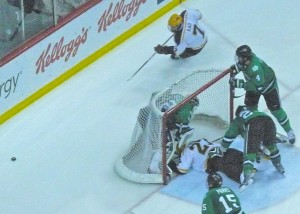
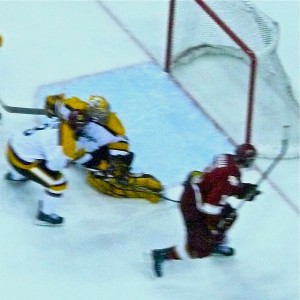
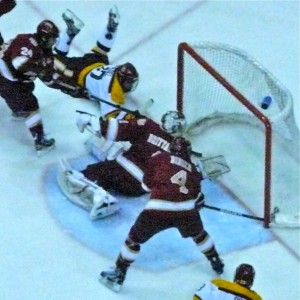
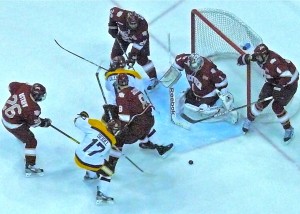

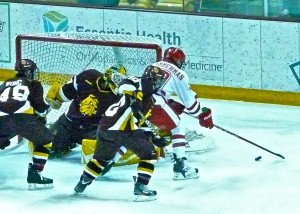
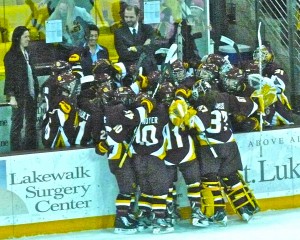
 John Gilbert is a lifetime Minnesotan and career journalist, specializing in cars and sports during and since spending 30 years at the Minneapolis Tribune, now the Star Tribune. More recently, he has continued translating the high-tech world of autos and sharing his passionate insights as a freelance writer/photographer/broadcaster. A member of the prestigious North American Car and Truck of the Year jury since 1993. John can be heard Monday-Friday from 9-11am on 610 KDAL(www.kdal610.com) on the "John Gilbert Show," and writes a column in the Duluth Reader.
John Gilbert is a lifetime Minnesotan and career journalist, specializing in cars and sports during and since spending 30 years at the Minneapolis Tribune, now the Star Tribune. More recently, he has continued translating the high-tech world of autos and sharing his passionate insights as a freelance writer/photographer/broadcaster. A member of the prestigious North American Car and Truck of the Year jury since 1993. John can be heard Monday-Friday from 9-11am on 610 KDAL(www.kdal610.com) on the "John Gilbert Show," and writes a column in the Duluth Reader.